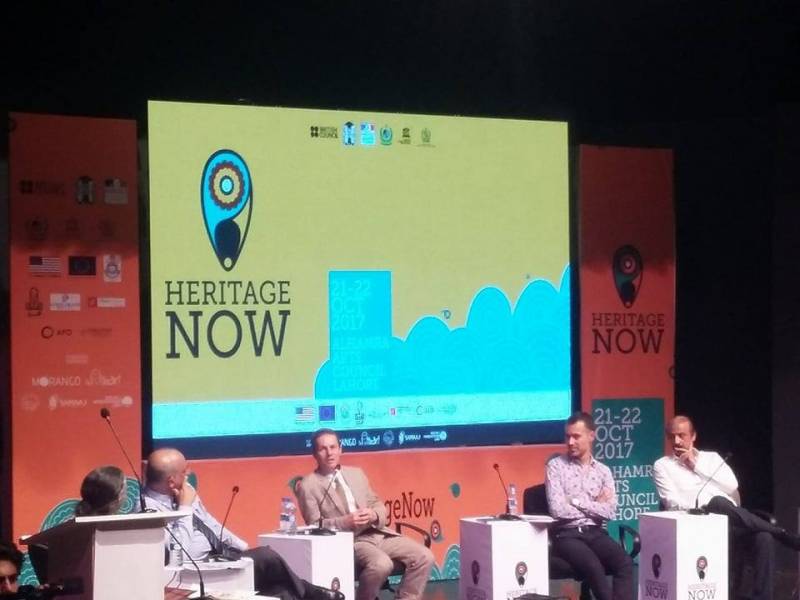LAHORE: The intelligentsia from United Kingdom and Pakistan urged concerned authorities to engage the local communities in executing heritage conservation and preservation projects in Pakistan as sustainable heritage is about uplifting the communities as well.
Speakers said in a thought provoking sessions on two-day Heritage Now festival arranged by British Conical held yesterday at Alhamra, The Mall.
The most exciting element about the event was the diversity of professional and the people attending it. The food court served a variety of traditional food items. There are number of stalls of crafts including paper art, handicrafts from Gilgit Baltistan. There was a Rangeela Rickshaw with which people took selfies with it. British Council also set up a library with theme of books, tea and talk where visitors could sip a cup of tea and read book.
Haroon who set up paper work stall told The Nation he get encouragement from people visitng the stall to build his own online store of his paper art. “For me paper art is about relaxing myself setting aside the worries of my life. Luckily this passion pays me back. These artworks are ranges from Rs 500 to Rs 2000,” he said.

Abdullah, student of Bachelors of Arts said this festival gave him a lot of knowledge about Pakistan and he came to know about the hidden heritage treasure of green land.

A puppet show was also organized by Rafi Peer Theater Workshop which children enjoyed the most. The puppet show depicted the Mughal emperor Akbar’s era story in an interactive way.
Duncan McCallun, Policy Director of ‘Historic England’ told The Nation that this was his first visit to Pakistan and it was truly tremendous. “Visiting the historical site in Walled city was mesmerizing experience. I think UK and Pakistan has a lot of work to do in collaboration and protecting heritage is a shared responsibility which Heritage Now conference has contributed a lot,” he said.
A panel discussion on education, culture and youth engagement was held at Hall no 2. The session was moderated by Vibeke Jensen.
Deputy Director of South East Asian Art Johannes Beltz said, “Our museum offers a new program on “Seeing art understanding culture” designed for schools (Primary, secondary, higher elementary and higher school) addressing not only children but also teachers and parents.
“We implement and enlarge the official syllabus by offering experimental learning through its collection, trained educators, local and international networks. In the classrooms of local schools our educators and community members meet their kids,” he said.
Federal Education Secretary Allah Baksh Malik said, “To integrate culture in education we should preserve our culture related knowledge, skills and repose it to the society. We should reflect regional and cultural identities of communities in curriculum.
He said for the standards for quality education being implemented in Pakistan’s syllabus as content (text and illustration) is free from gender bias and promotes positive image of girls and women and content reflects democratic values, ethics and values of all segments of society.
Principal for trust and history, Art Architecture of Punjab (THAAP) Sajida Vandal said, “After doing a project with UNESCO in 2013 we started realizing there are many serious efforts which people are making to promote education system,” she said.
Session on ‘Sustainable tourism and development’ speakers urged infringement of local values that are often be overlooked by the tourism industry.
Duncan McCallun, Policy Director of ‘Historic England’ said from tourism industry United Kingdom is earning 22 million Pound and this is backbone of the local economy.
“You can only earn through heritage tourism with conservation of the existing heritage. Like Oxford which is struggling to manage tourism pressure being a smaller city.
“Polperro is a picturesque fishing village which is one of the wealthiest places in UK also. The farmers in those areas are also struggling to living. We can’t deny rights of quality living of people living around the heritage site.
He said visitors should also be educated about the importance of heritage so they could not vandalized the monuments adding that diversification of communities is best policy to promote the heritage tourism and for that greater marketing is required.
Implementing on micro and macro sustainable tourism projects should be the strategy keeping in mind that everyplace is unique so act locally according to the demand, he said
WCLA Director General Kamra Lashari said WCLA working on the documentation of Royal Kitchen in Lahore Fort. “Demolished part of Royal Kitchens is being framed in 3D scanner as per international standards,” he said.
Lashley Anne Pulsipher who is associated with Hashoo Hotels said female representation in the tourism industry needs to increase. “Landed in 2014 in Pakistan changed my narrative about Pakistan which is quite contradictory according to media reports internationally,” she said.
“Diversity and sustainability is more than preserving environment. It’s about people,” Lashley Anne said.
Harood Rashid from World Bank speaking the session said according to recent nine studies WB conducted 2.9 million people globally showed interest in tourism in
“As China Pakistan Economic Corridor the tourism industry would also going to get boost but CPEC started from Kashgar to Gwadar there is a huge challenge as well to attract tourists and earn revenue,” he said.
“50 percent people visit their ancestor’s home and there is potential in religious Diaspora living aboard like Sikh which could even attract two million dollars of inflow coming in Punjab only with proper planning ,”
Rashid said there is no economic sector prospers unless you tab the potential of local investment and tourists.
The day ended with special performances. On the first day musical band The Sachal studio orchestra gave an electrifying performance and mesmerized the audience.






